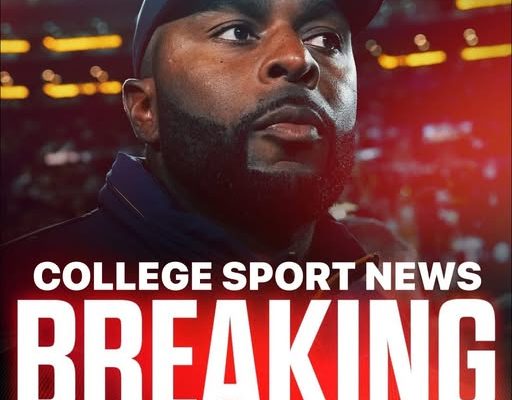According to ESPN’s Pete Thamel, head coach Sherrone Moore and the University of Michigan have decided to drop their appeals in the NCAA infractions case involving former staffer Connor Stalions, marking a significant step toward closure in one of the most publicized controversies in recent college football history. The decision signals a shift in Michigan’s approach—one that emphasizes cooperation, accountability, and a desire to move forward after a tumultuous year that tested the integrity and reputation of one of the sport’s proudest programs.
For months, the University of Michigan and its football program have been under intense scrutiny following allegations that Stalions, a former staff member, orchestrated a sign-stealing operation that violated NCAA rules. The saga quickly evolved into a national storyline that overshadowed Michigan’s on-field dominance, placing the Wolverines in the eye of a media storm and sparking debates about competitive fairness, ethics, and modern scouting practices in college football.
By dropping their appeals, Michigan and Moore are effectively accepting the NCAA’s findings and penalties, choosing resolution over prolonged confrontation. While the exact penalties are expected to be clarified in the coming weeks, sources close to the situation suggest that the university’s cooperation will likely influence the NCAA’s final judgment. For Michigan fans and players, the move brings a mixture of relief and resignation—a sign that while the program may bear the consequences of its past actions, it is also ready to reclaim its focus on the future.
The Connor Stalions controversy began innocuously but quickly spiraled into one of the most sensational stories in college athletics. Reports first emerged last year suggesting that Stalions had attended and recorded opponents’ games in person, collecting sideline signals and strategic information in violation of NCAA rules that prohibit in-person scouting of future opponents. At the time, the practice was viewed as an old-school relic of football’s early days—an act of gamesmanship that the modern game’s technological sophistication had rendered unnecessary and unethical. But as more details came to light, the scope of the operation became clearer.
Stalions was accused of coordinating a network of individuals who traveled across the country to record the signals of Michigan’s potential rivals. Videos and evidence suggested an organized effort, raising questions about how much the coaching staff knew and to what extent the operation influenced game outcomes. Although Stalions resigned in the wake of the investigation, the damage to Michigan’s public image had already been done.
The university initially defended its staff, emphasizing that the head coach and top assistants were unaware of Stalions’ activities. However, as the NCAA’s investigation deepened and evidence accumulated, Michigan found itself in a delicate position. Balancing institutional loyalty with the need for transparency became a defining challenge. Interim head coach Sherrone Moore, who took over following Jim Harbaugh’s departure, inherited both a championship-caliber team and a cloud of controversy that threatened to define his early tenure.
According to Thamel’s report, the decision to withdraw the appeals reflects a calculated and strategic move by Michigan’s leadership. Rather than prolonging a legal and administrative battle with uncertain results, the university appears determined to demonstrate accountability and close this chapter. NCAA investigations are notorious for their lengthy timelines, often stretching for years and weighing heavily on programs that must navigate the uncertainty of potential sanctions. By dropping their appeals, Michigan can begin to rebuild its credibility and refocus on football operations without the constant distraction of pending litigation and public speculation.
For Sherrone Moore, this moment also represents a test of leadership and maturity. As a first-year head coach, Moore has already faced extraordinary pressure—stepping into the shoes of Jim Harbaugh, maintaining Michigan’s elite on-field standards, and managing the fallout from a scandal that predates his tenure. By agreeing to move forward without further appeals, Moore demonstrates a commitment to integrity and a willingness to prioritize the program’s long-term health over short-term reputation management.
Behind the scenes, university officials reportedly debated the decision extensively. Some argued that continuing the appeal could yield reduced penalties or vindicate certain aspects of the case. Others believed that prolonging the process would only deepen the narrative that Michigan was resistant to accountability. Ultimately, the latter view prevailed, influenced in part by the understanding that full cooperation with the NCAA often results in leniency compared to prolonged defiance.
For the NCAA, this case has broader implications as well. It underscores the governing body’s determination to enforce its rules in an era when college athletics are undergoing radical transformation. With the advent of NIL (Name, Image, and Likeness) deals, the transfer portal, and a growing power imbalance between major conferences, the NCAA’s authority has often been questioned. The Michigan case, therefore, serves as a rare opportunity for the organization to reaffirm its regulatory role in maintaining fair play and competitive integrity across college sports.
Public reaction to the decision has been mixed. Among Michigan fans, there’s a prevailing sense of fatigue—many simply want the saga to end so that the focus can return to football. Others, however, view the move as a quiet admission of wrongdoing and a blemish on a program that prides itself on tradition and honor. Critics have been quick to draw comparisons to past NCAA infractions cases, pointing out that Michigan’s situation—while serious—pales in comparison to scandals involving recruiting violations or academic fraud. Still, in a sport where perception often matters as much as performance, even a minor integrity issue can leave a lasting mark.
Nationally, rival programs have seized upon the controversy as ammunition in the never-ending cycle of college football rivalries. Ohio State and Michigan State fans, in particular, have used the sign-stealing scandal as a talking point, questioning the legitimacy of Michigan’s recent success. Yet, even as the noise continues, most analysts agree that the Wolverines’ dominance on the field was not solely the product of any illegal advantage. Their physical style, disciplined execution, and elite player development have been hallmarks of Michigan football long before the Stalions story broke.
For players currently on the roster, the decision brings clarity. Throughout the investigation, the team maintained a “business-as-usual” approach, insisting that the outside distractions would not affect their preparation or performance. Nevertheless, the controversy created a constant backdrop of uncertainty—one that can weigh heavily on athletes who just want to compete. With the appeals now dropped, the team can finally focus fully on football without waiting for headlines or rulings to shape their season.
Institutionally, Michigan’s next steps will be crucial. The university’s compliance department is expected to work closely with the NCAA to ensure that all corrective measures are implemented. This will likely include enhanced monitoring of staff activities, stricter internal reporting protocols, and mandatory education sessions on NCAA compliance for coaches and analysts. While these measures may seem procedural, they send a broader message that Michigan intends to operate within the rules going forward.
The situation also carries symbolic weight for the Big Ten Conference, which was forced to navigate its own political challenges amid the scandal. Commissioner Tony Petitti faced calls from rival schools to impose conference-level discipline before the NCAA’s process concluded—a move that underscored the growing tension within the league. Michigan’s cooperation now allows the conference to move past the internal discord and focus on preserving unity as it expands and redefines its identity in the era of superconferences.
Ultimately, Michigan’s choice to drop its appeals is as much about optics as it is about substance. The decision allows the university to turn the page, projecting an image of integrity, responsibility, and a renewed commitment to doing things the right way. It also spares the program the protracted drama of hearings, counterarguments, and public accusations that have come to define many NCAA disputes in recent years.
As for Sherrone Moore, this chapter may well become a defining part of his early legacy. By choosing resolution over resistance, he positions himself as a leader capable of guiding Michigan through adversity with transparency and humility. It’s a powerful message to his players—that accountability and character matter just as much as wins and championships. In a sport where reputations are built not only on success but on the manner in which that success is achieved, Moore’s willingness to confront controversy head-on could earn him lasting respect.
For Michigan fans, alumni, and college football observers, the end of the appeals marks the end of a long, exhausting saga. While questions will linger about what exactly happened and who knew what, the decision provides a sense of finality. The Wolverines can now focus on rebuilding trust, both within their own community and across the broader landscape of college football.
In the end, the story of Michigan’s response to the Connor Stalions scandal may come to be seen not as a tale of disgrace but as a testament to resilience. Mistakes were made, reputations were tested, and the program was forced to confront uncomfortable truths. But by owning those mistakes and choosing accountability over defiance, Michigan has taken the first real step toward restoring its integrity and moving forward stronger than before.
As Sherrone Moore leads the Wolverines into a new era, this decision will stand as a defining moment—a reminder that in college athletics, redemption is possible not through denial, but through honesty, humility, and the courage to start anew.



